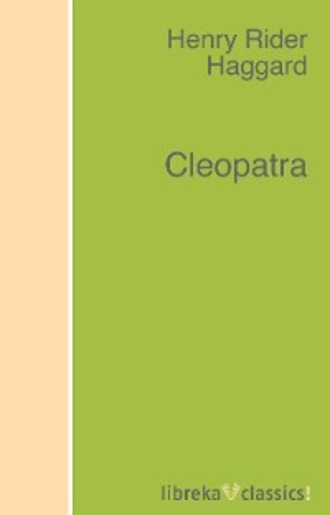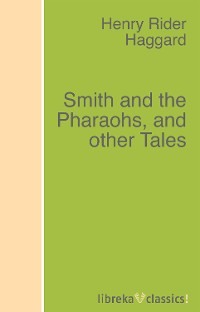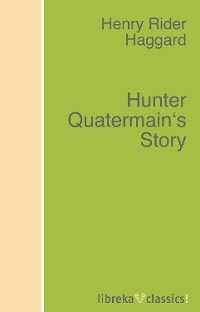
Полная версия
Cleopatra
"Well, there was nothing more to find, and now that the excitement was over, what between the heat, the exertion, and the smell of mummy dust and spices, I felt more dead than alive.
"I am tired of writing, and this ship rolls. This letter, of course, goes overland, and I am coming by 'long sea,' but I hope to be in London within ten days after you get it. Then I will tell you of my pleasing experiences in the course of the ascent from the tomb-chamber, and of how that prince of rascals, Ali Baba, and his thieves tried to frighten me into handing over the papyri, and how I worsted them. Then, too, we will get the rolls deciphered. I expect that they only contain the usual thing, copies of the 'Book of the Dead,' but there may be something else in them. Needless to say, I did not narrate this little adventure in Egypt, or I should have had the Boulac Museum people on my track. Good-bye, 'Mafish Fineesh,' as Ali Baba always said."
In due course, my friend, the writer of the letter from which I have quoted, arrived in London, and on the very next day we paid a visit to a learned acquaintance well versed in Hieroglyphics and Demotic writing. The anxiety with which we watched him skilfully damping and unfolding one of the rolls and peering through his gold-rimmed glasses at the mysterious characters may well be imagined.
"Hum," he said, "whatever it is, this is not a copy of the 'Book of the Dead.' By George, what's this? Cle—Cleo—Cleopatra——Why, my dear Sirs, as I am a living man, this is the history of somebody who lived in the days of Cleopatra, the Cleopatra, for here's Antony's name with hers! Well, there's six months' work before me here—six months, at the very least!" And in that joyful prospect he fairly lost control of himself, and skipped about the room, shaking hands with us at intervals, and saying "I'll translate—I'll translate it if it kills me, and we will publish it; and, by the living Osiris, it shall drive every Egyptologist in Europe mad with envy! Oh, what a find! what a most glorious find!"
And O you whose eyes fall upon these pages, see, they have been translated, and they have been printed, and here they lie before you—an undiscovered land wherein you are free to travel!
Harmachis speaks to you from his forgotten tomb. The walls of Time fall down, and, as at the lightning's leap, a picture from the past starts upon your view, framed in the darkness of the ages.
He shows you those two Egypts which the silent pyramids looked down upon long centuries ago—the Egypt of the Greek, the Roman, and the Ptolemy, and that other outworn Egypt of the Hierophant, hoary with years, heavy with the legends of antiquity and the memory of long-lost honours.
He tells you how the smouldering loyalty of the land of Khem blazed up before it died, and how fiercely the old Time-consecrated Faith struggled against the conquering tide of Change that rose, like Nile at flood, and drowned the ancient Gods of Egypt.
Here, in his pages, you shall learn the glory of Isis the Many-shaped, the Executrix of Decrees. Here you shall make acquaintance with the shade of Cleopatra, that "Thing of Flame," whose passion-breathing beauty shaped the destiny of Empires. Here you shall read how the soul of Charmion was slain of the sword her vengeance smithied.
Here Harmachis, the doomed Egyptian, being about to die, salutes you who follow on the path he trod. In the story of his broken years he shows to you what may in its degree be the story of your own. Crying aloud from that dim Amenti[*] where to-day he wears out his long atoning time, he tells, in the history of his fall, the fate of him who, however sorely tried, forgets his God, his Honour, and his Country.
BOOK I—THE PREPARATION OF HARMACHIS
CHAPTER I
OF THE BIRTH OF HARMACHIS; THE PROPHECY OF THE HATHORS; AND THE SLAYING OF THE INNOCENT CHILD
By Osiris who sleeps at Abouthis, I write the truth.
I, Harmachis, Hereditary Priest of the Temple, reared by the divine Sethi, aforetime a Pharaoh of Egypt, and now justified in Osiris and ruling in Amenti. I, Harmachis, by right Divine and by true descent of blood King of the Double Crown, and Pharaoh of the Upper and Lower Land. I, Harmachis, who cast aside the opening flower of our hope, who turned from the glorious path, who forgot the voice of God in hearkening to the voice of woman. I, Harmachis, the fallen, in whom are gathered up all woes as waters are gathered in a desert well, who have tasted of every shame, who through betrayal have betrayed, who in losing the glory that is here have lost the glory which is to be, who am utterly undone—I write, and, by Him who sleeps at Abouthis, I write the truth.
O Egypt!—dear land of Khem, whose black soil nourished up my mortal part—land that I have betrayed—O Osiris!—Isis!—Horus!—ye Gods of Egypt whom I have betrayed!—O ye temples whose pylons strike the sky, whose faith I have betrayed!—O Royal blood of the Pharaohs of eld, that yet runs within these withered veins—whose virtue I have betrayed!—O Invisible Essence of all Good! and O Fate, whose balance rested on my hand—hear me; and, to the day of utter doom, bear me witness that I write the truth.
Even while I write, beyond the fertile fields, the Nile is running red, as though with blood. Before me the sunlight beats upon the far Arabian hills, and falls upon the piles of Abouthis. Still the priests make orison within the temples at Abouthis that know me no more; still the sacrifice is offered, and the stony roofs echo back the people's prayers. Still from this lone cell within my prison-tower, I, the Word of Shame, watch thy fluttering banners, Abouthis, flaunting from thy pylon walls, and hear the chants as the long procession winds from sanctuary to sanctuary.
Abouthis, lost Abouthis! my heart goes out toward thee! For the day comes when the desert sands shall fill thy secret places! Thy Gods are doomed, O Abouthis! New Faiths shall make a mock of all thy Holies, and Centurion shall call upon Centurion across thy fortress-walls. I weep—I weep tears of blood: for mine is the sin that brought about these evils and mine for ever is their shame.
Behold, it is written hereafter.
Here in Abouthis I was born, I, Harmachis, and my father, the justified in Osiris, was High Priest of the Temple of Sethi. And on that same day of my birth Cleopatra, the Queen of Egypt, was born also. I passed my youth in yonder fields watching the baser people at their labours and going in and out at will among the great courts of the temples. Of my mother I knew naught, for she died when I yet hung at the breast. But before she died in the reign of Ptolemy Aulêtes, who is named the Piper, so did the old wife, Atoua, told me, my mother took a golden uræus, the snake symbol of our Royalty of Egypt, from a coffer of ivory and laid it on my brow. And those who saw her do this believed that she was distraught of the Divinity, and in her madness foreshadowed that the day of the Macedonian Lagidæ was ended, and that Egypt's sceptre should pass again to the hand of Egypt's true and Royal race. But when my father, the old High Priest Amenemhat, whose only child I was, she who was his wife before my mother having been, for what crime I know not, cursed with barrenness by Sekhet: I say when my father came in and saw what the dying woman had done, he lifted up his hands towards the vault of heaven and adored the Invisible, because of the sign that had been sent. And as he adored, the Hathors[*] filled my dying mother with the Spirit of Prophecy, and she rose in strength from the couch and prostrated herself thrice before the cradle where I lay asleep, the Royal asp upon my brow, crying aloud:
"Hail to thee, fruit of my womb! Hail to thee, Royal child! Hail to thee, Pharaoh that shalt be! Hail to thee, God that shalt purge the land, Divine seed of Nekt-nebf, the descended from Isis. Keep thee pure, and thou shalt rule and deliver Egypt and not be broken. But if thou dost fail in thy hour of trial, then may the curse of all the Gods of Egypt rest upon thee, and the curse of thy Royal forefathers, the justified, who ruled the land before thee from the age of Horus. Then in life mayst thou be wretched, and after death may Osiris refuse thee, and the judges of Amenti give judgment against thee, and Set and Sekhet torment thee, till such time as thy sin is purged, and the Gods of Egypt, called by strange names, are once more worshipped in the Temples of Egypt, and the staff of the Oppressor is broken, and the footsteps of the Foreigner are swept clean, and the thing is accomplished as thou in thy weakness shalt cause it to be done."
When she had spoken thus, the Spirit of Prophecy went out of her, and she fell dead across the cradle where I slept, so that I awoke with a cry.
But my father, Amenemhat, the High Priest, trembled, and was very fearful, both because of the words which had been said by the Spirit of the Hathors through the mouth of my mother, and because what had been uttered was treason against Ptolemy. For he knew that, if the matter should come to the ears of Ptolemy, Pharaoh would send his guards to destroy the life of the child concerning whom such things were prophesied. Therefore, my father shut the doors, and caused all those who stood by to swear upon the holy symbol of his office, and by the name of the Divine Three, and by the Soul of her who lay dead upon the stones beside them, that nothing of what they had seen and heard should pass their lips.
Now among the company was the old wife, Atoua, who had been the nurse of my mother, and loved her well; and in these days, though I know not how it had been in the past, nor how it shall be in the future, there is no oath that can bind a woman's tongue. And so it came about that by-and-by, when the matter had become homely in her mind, and her fear had fallen from her, she spoke of the prophecy to her daughter, who nursed me at the breast now that my mother was dead. She did this as they walked together in the desert carrying food to the husband of the daughter, who was a sculptor, and shaped effigies of the holy Gods in the tombs that are fashioned in the rock—telling the daughter, my nurse, how great must be her care and love toward the child that should one day be Pharaoh, and drive the Ptolemies from Egypt. But the daughter, my nurse, was so filled with wonder at what she heard that she could not keep the tale locked within her breast, and in the night she awoke her husband, and, in her turn, whispered it to him, and thereby compassed her own destruction, and the destruction of her child, my foster-brother. For the man told his friend, and the friend was a spy of Ptolemy's, and thus the tale came to Pharaoh's ears.
Now, Pharaoh was much troubled thereat, for though when he was full of wine he would make a mock of the God of the Egyptians, and swear that the Roman Senate was the only God to whom he bowed the knee, yet in his heart he was terribly afraid, as I have learned from one who was his physician. For when he was alone at night he would scream and cry aloud to the great Serapis, who indeed is no true God, and to other Gods, fearing lest he should be murdered and his soul handed over to the tormentors. Also, when he felt his throne tremble under him, he would send large presents to the temples, asking a message from the oracles, and more especially from the oracle that is at Philæ. Therefore, when it came to his ears that the wife of the High Priest of the great and ancient Temple of Abouthis had been filled with the Spirit of Prophecy before she died, and foretold that her son should be Pharaoh, he was much afraid, and summoning some trusty guards—who, being Greeks, did not fear to do sacrilege—he despatched them by boat up the Nile, with orders to come to Abouthis and cut off the head of the child of the High Priest and bring it to him in a basket.
But, as it chanced, the boat in which the guards came was of deep draught, and, the time of their coming being at the lowest ebb of the river, it struck and remained fast upon a bank of mud that is opposite the mouth of the road running across the plains to Abouthis, and, as the north wind was blowing very fiercely, it was like to sink. Thereon the guards of Pharaoh called out to the common people, who laboured at lifting water along the banks of the river, to come with boats and take them off; but, seeing that they were Greeks of Alexandria, the people would not, for the Egyptians do not love the Greeks. Then the guards cried that they were on Pharaoh's business, and still the people would not, asking what was their business. Whereon a eunuch among them who had made himself drunk in his fear, told them that they came to slay the child of Amenemhat, the High Priest, of whom it was prophesied that he should be Pharaoh and sweep the Greeks from Egypt. And then the people feared to stand longer in doubt, but brought boats, not knowing what might be meant by the man's words. But there was one amongst them—a farmer and an overseer of canals—who was a kinsman of my mother's and had been present when she prophesied; and he turned and ran swiftly for three parts of an hour, till he came to where I lay in the house that is without the north wall of the great Temple. Now, as it chanced, my father was away in that part of the Place of Tombs which is to the left of the large fortress, and Pharaoh's guards, mounted on asses, were hard upon us. Then the messenger cried to the old wife, Atoua, whose tongue had brought about the evil, and told how the soldiers drew near to slay me. And they looked at each other, not knowing what to do; for, had they hid me, the guards would not have stayed their search till I was found. But the man, gazing through the doorway, saw a little child at play:
"Woman," he said, "whose is that child?"
"It is my grandchild," she answered, "the foster-brother of the Prince Harmachis; the child to whose mother we owe this evil case."
"Woman," he said, "thou knowest thy duty, do it!" and he again pointed at the child. "I command thee, by the Holy Name!"
Atoua trembled exceedingly, because the child was of her own blood; but, nevertheless, she took the boy and washed him and set a robe of silk upon him, and laid him on my cradle. And me she took and smeared with mud to make my fair skin darker, and, drawing my garment from me, set me to play in the dirt of the yard, which I did right gladly.
Then the man hid himself, and presently the soldiers rode up and asked of the old wife if this were the dwelling of the High Priest Amenemhat? And she told them yea, and, bidding them enter, offered them honey and milk, for they were thirsty.
When they had drunk, the eunuch who was with them asked if that were the son of Amenemhat who lay in the cradle; and she said "Yea—yea," and began to tell the guards how he would be great, for it had been prophesied of him that he should one day rule them all.
But the Greek guards laughed, and one of them, seizing the child, smote off his head with a sword; and the eunuch drew forth the signet of Pharaoh as warrant for the deed and showed it to the old wife, Atoua, bidding her tell the High Priest that his son should be King without a head.
And as they went one of their number saw me playing in the dirt and called out that there was more breeding in yonder brat than in the Prince Harmachis; and for a moment they wavered, thinking to slay me also, but in the end they passed on, bearing the head of my foster-brother, for they loved not to murder little children.
After a while, the mother of the dead child returned from the market-place, and when she found what had been done, she and her husband would have killed Atoua the old wife, her mother, and given me up to the soldiers of Pharaoh. But my father came in also and learned the truth, and he caused the man and his wife to be seized by night and hidden away in the dark places of the temple, so that none saw them more.
But I would to-day that it had been the will of the Gods that I had been slain of the soldiers and not the innocent child.
Thereafter it was given out that the High Priest Amenemhat had taken me to be as a son to him in the place of that Harmachis who was slain of Pharaoh.
CHAPTER II
OF THE DISOBEDIENCE OF HARMACHIS; OF THE SLAYING OF THE LION; AND OF THE SPEECH OF THE OLD WIFE, ATOUA
And after these things Ptolemy the Piper troubled us no more, nor did he again send his soldiers to seek for him of whom it was prophesied that he should be Pharaoh. For the head of the child, my foster-brother, was brought to him by the eunuch as he sat in his palace of marble at Alexandria, flushed with Cyprian wine, and played upon the flute before his women. And at his bidding the eunuch lifted up the head by the hair for him to look on. Then he laughed and smote it on the cheek with his sandal, bidding one of the girls crown Pharaoh with flowers. And he bowed the knee, and mocked the head of the innocent child. But the girl, who was sharp of tongue—for all of this I heard in after years—said to him that "he did well to bow the knee, for this child was indeed Pharaoh, the greatest of Pharaohs, and his name was the Osiris and his throne was Death."
Aulêtes was much troubled at these words, and trembled, for, being a wicked man, he greatly feared entering into Amenti. So he caused the girl to be slain because of the evil omen of her saying; crying that he would send her to worship that Pharaoh whom she had named. And the other women he sent away, and played no more upon the flute till he was once again drunk on the morrow. But the Alexandrians made a song on the matter, which is still sung about the streets. And this is the beginning of it—
After this the years passed on, nor did I, being very little, know anything of the great things that came to pass in Egypt; nor is it my purpose to set them out here. For I, Harmachis, having little time left to me, will only speak of those things with which I have been concerned.
And as the time went on, my father and the teachers instructed me in the ancient learning of our people, and in such matters appertaining to the Gods as it is meet that children should know. So I grew strong and comely, for my hair was black as the hair of the divine Nout, and my eyes were blue as the blue lotus, and my skin was like the alabaster within the sanctuaries. For now that these glories have passed from me I may speak of them without shame. I was strong also. There was no youth of my years in Abouthis who could stand against me to wrestle with me, nor could any throw so far with the sling or spear. And I much yearned to hunt the lion; but he whom I called my father forbade me, telling me that my life was of too great worth to be so lightly hazarded. But when I bowed before him and prayed he would make his meaning clear to me, the old man frowned and answered that the Gods made all things clear in their own season. For my part, however, I went away in wroth, for there was a youth in Abouthis who with others had slain a lion which fell upon his father's herds, and, being envious of my strength and beauty, he set it about that I was cowardly at heart, in that when I went out to hunt I only slew jackals and gazelles. Now, this was when I had reached my seventeenth year and was a man grown.
It chanced, therefore, that as I went sore at heart from the presence of the High Priest, I met this youth, who called to me and mocked me, bidding me know the country people had told him that a great lion was down among the rushes by the banks of the canal which runs past the Temple, lying at a distance of thirty stadia from Abouthis. And, still mocking me, he asked me if I would come and help him slay this lion, or would I go and sit among the old women and bid them comb my side lock? This bitter word so angered me that I was near to falling on him; but in place therefore, forgetting my father's saying, I answered that if he would come alone, I would go with him and seek this lion, and he should learn if I were indeed a coward. And at first he would not, for, as men know, it is our custom to hunt the lion in companies; so it was my hour to mock. Then he went and fetched his bow and arrows and a sharp knife. And I brought forth my heavy spear, which had a shaft of thorn-wood, and at its end a pomegranate in silver, to hold the hand from slipping; and, in silence, we went, side by side, to where the lion lay. When we came to the place, it was near sundown; and there, upon the mud of the canal-bank, we found the lion's slot, which ran into a thick clump of reeds.
"Now, thou boaster," I said, "wilt thou lead the way into yonder reeds, or shall I?" And I made as though I would lead the way.
"Nay, nay," he answered, "be not so mad! The brute will spring upon thee and rend thee. See! I will shoot among the reeds. Perchance, if he sleeps, it will arouse him." And he drew his bow at a venture.
How it chanced I know not, but the arrow struck the sleeping lion, and, like a flash of light from the belly of a cloud, he bounded from the shelter of the reeds, and stood before us with bristling mane and yellow eyes, the arrow quivering in his flank. He roared aloud in fury, and the earth shook.
"Shoot with the bow," I cried, "shoot swiftly ere he spring!"
But courage had left the breast of the boaster, his jaw dropped down and his fingers unloosed their hold so that the bow fell from them; then, with a loud cry he turned and fled behind me, leaving the lion in my path. But while I stood waiting my doom, for though I was sore afraid I would not fly, the lion crouched himself, and turning not aside, with one great bound swept over me, touching me not. He lit, and again he bounded full upon the boaster's back, striking him such a blow with his great paw that his head was crushed as an egg thrown against a stone. He fell down dead, and the lion stood and roared over him. Then I was mad with horror, and, scarce knowing what I did, I grasped my spear and with a shout I charged. As I charged the lion lifted himself up above me. He smote at me with his paw; but with all my strength I drove the broad spear into his throat, and, shrinking from the agony of the steel, his blow fell short and did no more than rip my skin. Back he fell, the great spear far in his throat; then rising, he roared in pain and leapt twice the height of a man straight into the air, smiting at the spear with his forepaws. Twice he leapt thus, horrible to see, and twice he fell upon his back. Then his strength spent itself with his rushing blood, and, groaning like a bull, he died; while I, being but a lad, stood and trembled with fear now that all cause of fear had passed.
But as I stood and gazed at the body of him who had taunted me, and at the carcass of the lion, a woman came running towards me, even the same old wife, Atoua, who, though I knew it not as yet, had offered up her flesh and blood that I might be saved alive. For she had been gathering simples, in which she had great skill, by the water's edge, not knowing that there was a lion near (and, indeed, the lions, for the most part, are not found in the tilled land, but rather in the desert and the Libyan mountains), and had seen from a distance that which I have set down. Now, when she was come, she knew me for Harmachis, and, bending herself, she made obeisance to me, and saluted me, calling me Royal, and worthy of all honour, and beloved, and chosen of the Holy Three, ay, and by the name of the Pharaoh! the Deliverer!
But I, thinking that terror had made her sick of mind, asked her of what she would speak.
"Is it a great thing," I asked, "that I should slay a lion? Is it a matter worthy of such talk as thine? There live, and have lived, men who have slain many lions. Did not the Divine Amen-hetep the Osirian slay with his own hand more than a hundred lions? Is it not written on the scarabæus that hangs within my father's chamber, that he slew lions aforetime? And have not others done likewise? Why then, speakest thou thus, O foolish woman?"
All of which I said, because, having now slain the lion, I was minded, after the manner of youth, to hold it as a thing of no account. But she did not cease to make obeisance, and to call me by names that are too high to be written.








